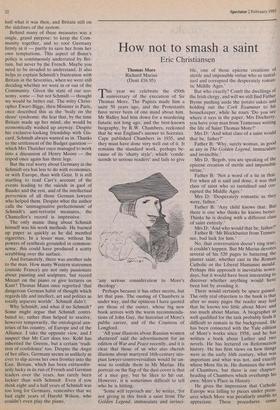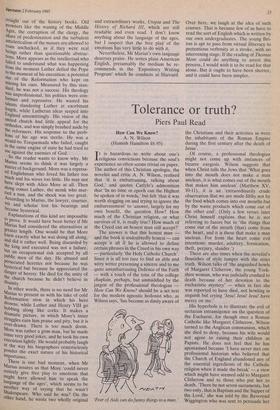How not to smash a saint
Eric Christiansen
Thomas More Richard Marius (Dent £16.95) This year we celebrate the 450th 1 anniversary of the execution of Sir Thomas More. The Papists made him a saint 50 years ago, and the Protestants have never been of one mind about him. Mr Ridley had him down for a murdering fanatic not long ago, and the best-known biography, by R.W. Chambers, reckoned that he was England's answer to Socrates. Cape published Chambers in 1935, and they must have done very well out of it. It remains the standard work, perhaps be- cause of its 'chatty style', which 'conde- scends to serious readers' and fails to give 'any serious consideration to More's theology'.
Perhaps because it has other merits, but let that pass. The ousting of Chambers is under way, and the opinions I have quoted are those of the ouster, whose big new book arrives with the warm recommenda- tions of John Guy, the historian of More's public career, and of the Countess of Longford.
'All your illusions about Russian women shattered' said the advertisement for an edition of War and Peace recently, and it is clear that those of us who also cherish illusions about martyred 16th-century uto- pian lawyer-controversialists would be un- wise to confide them to Mr Marius. His portrait on the flap of the dust-cover is that of a nice guy, but he likes to hit out. However, it is sometimes difficult to tell who he is hitting.
'Some will reproach me', he writes, 'for not giving in this book a saint from The Golden Legend, immaculate and invinci- ble, one of those epicene creations of sterile and impossible virtue who so tantal- ised and corrupted the desperately roman- tic Middle Ages.' But who exactly? Comb the dwellings of the Irish clergy, and will we still find Father Byrne pushing aside the potato cakes and holding out the Cork Examiner to his housekeeper, while he roars 'Do you see where it says in the paper, Mrs Docherty, you have your man from Tennessee writing the life of Saint Thomas More?'
Mrs D: 'And what class of a saint would that be, father?'
Father B: 'Why, surely woman, as good as any in The Golden Legend, immaculate and invincible.'
Mrs D. 'Begob, you are speaking of the epicene creation of sterile and impossible virtue.'
Father B: 'Not a word of a lie in that. For when all is said and done, it was that class of saint who so tantalised and cor- rupted the Middle Ages.' Mrs D: 'Desperately romantic as they were, father.' Father B: 'Any child knows that. But there is one who thinks he knows better. Thinks he is dealing with a different class of saint entirely.'
Mrs D: 'And who would that be, father?' Father B: `Mr Blockbuster from Tennes- see, bad luck for him.'
No, that conversation doesn't ring true; it couldn't happen. But Mr Marius devotes several of his 520 pages to battering the plaster saint, whether cast in the Roman Catholic or the Liberal Humanist mould. Perhaps this approach is inevitable nowa- days, but it would have been interesting to discover whether anything would have been lost by avoiding it.
There would certainly be space gained. The only real objection to the book is that after so many pages the reader may feel that he knows too little about More and too much about Marius. A biographer as well qualified for the task probably finds it difficult to remain in the background. He has been connected with the Yale edition of More's works since 1958, and he has written a book about Luther and two novels. He has lectured on Reformation history. He has firm views on how things were in the early 16th century, what was important and what was not, and exactly where More fits in. He dismisses the work of Chambers, but there is one chapter heading of Chambers which overhangs his own: More's Place in History. He gives the impression that Catholic Europe was falling to pieces under press- ures which More was peculiarly unable to appreciate. These procedures come
straight out of the history books. Old monsters like the waning of the Middle Ages, the corruption of the clergy, the allure of predestination and the turbulent anticlericalism of the masses are allowed to roam unchecked, as if they were real beings rather than questionable abstrac- tions. More appears as the intellectual who failed to understand what was happening from the moment Luther defied the Pope to the moment of his execution: a potential star of the Reformation who kept on missing his cues. Measured by this stan- dard, he was not a success. His theology Was unprofessional, his politics were con- formist and repressive. He wasted his talents slandering Luther at exorbitant length, while Lutheran ideas seeped into England unremittingly. His vision of the united church had little appeal for the orthodox, and was simply brushed aside by he reformers. His response to the prob- lems of his age was sterile. He was a w. ould-be Torquemada who failed, caught In the same engine of state he had tried to use against the enemies of God. So the reader wants to know why. Mr Marius seems to think it was largely a matter of background. More was a repress- ed Englishman who loved his father too much and his wives too little. He may not have slept with Alice More at all. Then along comes Luther, the monk who mar- 'led a nun, and the shock was too great. According to Marius, the lawyer, courtier, wit and scholar lost his bearings and became hysterical. Explanations of this kind are impossible to prove. It would have been better if Mr Marius had considered the alternatives at greater length. One would be that More knew exactly what he was doing all along, and did it rather well. Being discarded by the king and executed was not a failure, but an occupational risk accepted by all Public men of the day. He abused and Persecuted heretics not because he was hysterical but because he appreciated the danger of heresy. He died for the unity of the church because he didn't believe in disunity. In other words, there is no need for Mr Marius to present us with his lake of cold Reformation stew in which his hero drowns, while Luther and Henry VIII go bobbing along like corks. It makes a dramatic picture, in which More's inner struggles earn him praise and pity, but it is over-drawn. There is too much doom. More was rather a grim man, but he made some very good jokes, and he took his own execution lightly. He would probably laugh at the way his biographers remorselessly Ponder the exact nature of his historical importance.
There is one bad moment, when Mr Marius assures us that More 'could never entirely give free play to emotions that might have allowed him to speak the language of the ages', which seems to be another way of saying that he wasn't Shakespeare. Who said he was? On the Other hand, he wrote two wholly original and extraordinary works, Utopia and The History of Richard III, which are still readable and even read. I don't know anything about the language of the ages, but I suspect that the free play of the emotions has very little to do with it.
Nevertheless, Mr Marius's own language deserves praise. He writes plain American English, presumably the medium he re- commends in the 'Expository Writing Program' which he conducts at Harvard. Over here, we laugh at the idea of such courses. That is because few of us have to read the sort of English which is written by our own undergraduates. The young Bri- ton is apt to pass from virtual illiteracy to pretentious verbosity at a stroke, with no intervening stage. If the reading of Thomas More could do anything to arrest this process, I would wish it to be read for that alone. But it ought to have been shorter, and it could have been simpler.











































 Previous page
Previous page